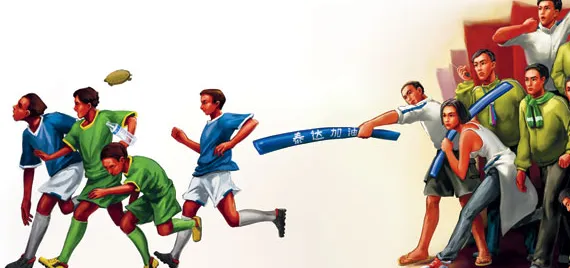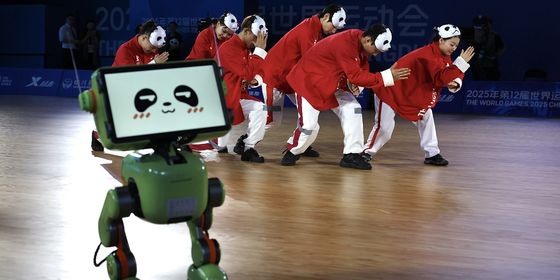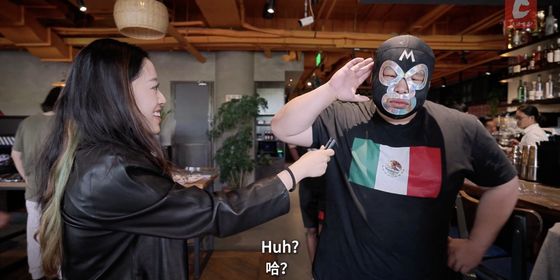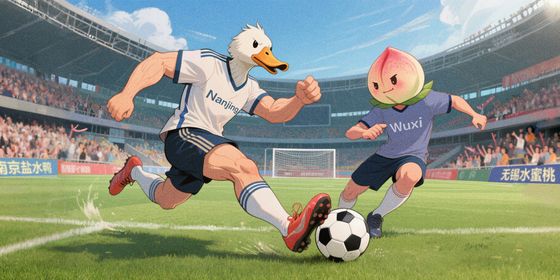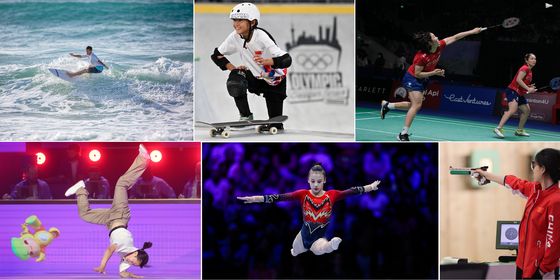A look at China’s fanatical football fans
Welcome to game night at the Beijing Worker’s Stadium! Tonight, if you haven’t heard already, features two rivals with a bitter history: Beijing Guo’an (国安) “The Royal Guards” (御林军 Huángjiā wèiduì) slugging it out against Tianjin Teda (泰达). The pitch is green with youthful vigor and ready for the brutal trampling, stomping, and kicking it is about to receive, and the air is blazing with the fire o f the Friday night lights. And pound the ground they do. Guo’an Forward Joffre “Dinamita” Guerron, traps a wide pass from Defender and Captain Xu Yunlong—now challenged by Tianjin’s Hu Rentian. It looks painful. Guerron is down, and the ref doesn’t look too happy about it, either. The crowd begin their usual antics. Here come the unceremoniously tossed fruits and vegetables. It looks like Hu just got clocked by a bottle of water! Security is on edge; the bitter rivalry makes tonight a particularly difficult security risk. The referee calls a penalty kick for Guerron, who’s limping to the pitch. He lines up the shot. Oh, and it goes wide! It appears that Guerron was momentarily blinded by someone shining a powerful laser pointer from the stands. The Guo’an fans are up in arms!They’re pushing, shoving, trying to get into the Tianjin section, but the police won’t let them through.
It can be said that, in addition to death and taxes, fighting over football is also a life certainty. Known around the world for rambunctious rage on and off the turf—football fans in China are no exception. China’s soccer sympathizers are equally rancid when it comes to supporting their favorite team. Yet, the fundamental differences in the raison d’être of China’s fighting football fans and the rest of the world run deep within the socioeconomic lifeblood of the country.
Sun, a pseudonym for a 30-year-old, unemployed man, sells bottles to recycling centers in Beijing for a living. Since the age of seven, when his father took him to a football game for his birthday, Sun has been an avid football fan and somehow scrambles together enough money for the 100 RMB price of a ticket. As a die-hard Guo’an fan, Sun keeps close tabs on, and is involved in, Beijing football politics.
In 2011, Huang Bowen, Guoan’s Defensive mid-fielder and China’s youngest top scorer, left the country to play in the Korean K-League. While many fans were upset about this, their rage multiplied when, after having promised to return to Guo’an, Huang and his manager decided on Guangzhou Evergrande instead. Sun found himself amidst the roaring swell of Guo’an fans, during Guangzhou Evergrande’s April 2, 2013 match at Worker’s Stadium. At press conferences before and after the game, Huang had drinks and various foodstuffs thrown at him by angry Guo’an fans. Buses and car windows were smashed before the game. During the game itself, wads of fake money were thrown at Huang, a seething symbol of his lechery.
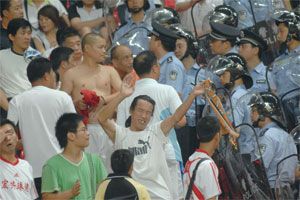
In the 13th round of the CFA Super League, police intervene in a scufflein Wuhan
As he took a victory lap around the pitch, enraged Guo’an fans began to throw more food and drinks at their betrayer. By the time he had reached the north stands, police were forced to form a barricade against the throng of angry fanatics, already threatening to break out onto the field.
Sun was among the diehards who did not take Huang’s purported treachery lightly. “I felt like he had betrayed us for money,” Sun recalled.
While not all Chinese football matches are contested by fans, the rivalry between Beijing Guo’an and Tianjin Teda represents the extremity of football hooliganism. “These days, if Beijing and Tianjin are playing each other, depending on the home turf, there won’t be a dedicated area for fans of the opposing side,” Sun says. “If there’s a car with Tianjin license plates parked outside of the Beijing Worker’s Stadium on the night of a game, it will be totaled, without a doubt.”
In fact, Beijing football hooliganism is so vehement that it has spawned the term “Beijing Anger” or 京骂 ( Jīng mà), a term that can be generally applied to anybody who is excessively angry or confrontational but specifically refers to the antics of Beijing Guo’an fans. During a “jingma” session, up to 30 thousand people in the stands will synchronically scream obscenities at players.Beijing’s football fans have employed numerous methods of stadium aggression in order to minimize chances of getting caught, maximize humiliation, and shame their targets. Among Tianjin’s famous cuisines are steamed buns also known as “Dog-Doesn’t-Care” buns (狗不理包子 Gǒu bù lǐ bāozi ).
Beijing fans constantly throw the delectable buns onto the field by the thousands as Tianjin players line up near the stands. Using condoms as water balloons, fans toss water bombs onto the field by the hundreds, soaking players and interrupting playtime. Beijing fans have come under fire for constantly destroying rival team buses—the saying goes: “The journey home from Worker’s Stadium can only begin after the bus is fixed.”
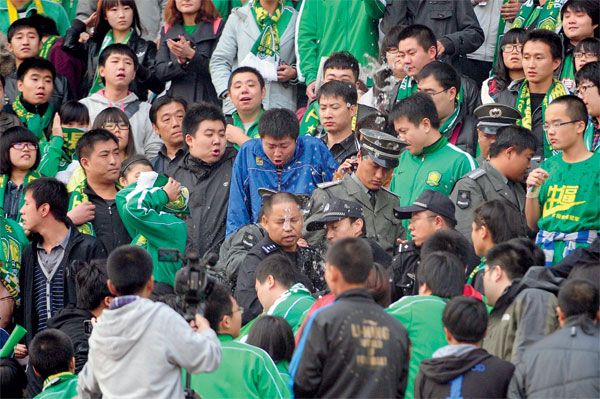
Throwing drinks and minor brawls are staples at Guo’an games
Beijing fans are often joined by thousands of foreigners studying or working in Beijing, who partake in all these activities and can get closer to rival teams than most Chinese are allowed.
During Tianjin/Beijing games, Tianjin fans often throw live green turtles at Guo’an players because of similarity in color to the lime green of Guo’an jerseys. Fans from opposing teams have often been caught throwing burning rival jerseys onto the pitch in order to maximize confusion mid-game.
While China has local football rivalries, violence rarely extends to other fans and usually hits directly on security or police hellbent on keeping the two sides at bay.
One Guo’an fan who spoke on condition of anonymity—referred to here as Xiao Wang—is a reminder that fear follows the bravado of hooliganism. Xiao Wang, a college sophomore, is quick to take credit for throwing drinks and using laser pointers but says he has never resorted to actual violence. He, like many football fanatics, takes pride in his work, bragging that he was able to hit players on the field with his drink, twice.
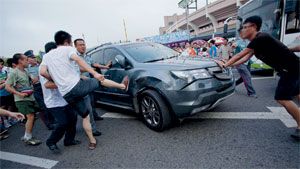
Fanatical fans destroy cars in the 14th round of the CFA Super League between Shanghai and Qingdao
“Last July, I went to Tianjin alone. I tried to provoke Tianjin fans to show how brave our Guo’an fans are. Then, when I came back to Beijing, I could brag to my friends that I was cool and
brave,” Xiao Wang says, but things didn’t go exactly as he planned. He didn’t expect the Tianjin fans to be just as fanatical, just as brazen, as he was. “I thought I was brave, that I could do something that the ordinary people couldn’t do. Actually, I was very timid.”
As many do, Xiao Wang felt fear in the face of the mob: “There were so many Tianjin fans. I was afraid that they would find out I was a Guo’an fan. I panicked. I kept silent. I couldn’t let them find out I was a Guo’an fan.”
Outside the stadium, it was enough to frighten away any Beijing Guo’an fan. Hawkers were selling green tortoises, shouting out prices, and not just to throw on the field. Some o f them would just put the turtles underfoot, a way to show disrespect to Beijing fans, according to Xiao Wang. “If these things happened in Beijing, if I beat them to death, I am not a man. But there I was quiet, because I was the only one.” As such, Xiao Wang is ashamed of his actions, ashamed of not standing up for his team, and he knows that if his friends ever find out, he will lose serious face.
The tables are, of course, turned on the fans’ home turf. The sense of solitude is altered completely, where the supporters enter a reality not unlike church, a place they know they will be accepted. “When I am in Beijing Worker’s Stadium, my courage is very high, abusing and scolding together with my friends,” Xiao Wang says, adding: “In this kind of atmosphere, if someone started a fight, I would join in and fight together with my friends.”

More madness at the CFA Super League
Technology also plays a part. In the past, fans would just meet up (accidentally or at a prearranged time) to brawl. Today, social media and direct contact to other fanatical football enthusiasts is easy and immediate. Xiao Wang says that, if Tianjin fans start to stir up trouble, a WeChat (微信 Wēixìn) is sent to like-minded fans who will rush
to aid in what has the potential to be a violent altercation.
But there is a question at the nexus of all this chaos. What brings people like Sun, who ekes out a living collecting recycling to pay the bills, and Xiao Wang, a student with a promising future, together? The thrill of chucking bottles en masse is one reason, but, individually, the fans feel something akin to righteousness and peace. Xiao Wang describes his feelings in the fray: “Is it adrenaline for me? I am not so sure. My whole body feels calm; I forget all the things that bother me. It relieves my bad mood. For example, fights with my girlfriend and problems at school, all these annoying things are forgotten.”
Like many football “hooligans” in China and around the world, Xiao Wang doesn’t think his antics are anything to get worked up about. He believes throwing bottles, smashing bus windows, and burning jerseys is just good fun, referring to it as “harmless”. And compared to many other countries, China’s football hooligan problem is relatively tame.
In Europe, violence has always accompanied the antics of football hooligans. A 2005 paper by the Social Issues Research Centre (SIRC) dates violence in English football all the way back to the 13th century, where medieval football matches turned into pitched battles involving hundreds of onlookers from rival townships and were used to settle feudal, territorial, and social disputes.
While football in China is a relatively new sport, it hasn’t stopped the rapid institutionalization of violence within the development of the pastime. It is a well-known fact that hooliganism in Chinese football is not only increasing in intensity, but scope. This growing intensity of violence and the vehemence with which hooliganism is perpetrated are indicative of more than just love of a sport—a hint at the sociopolitical lifeblood that courses through the veins of China.
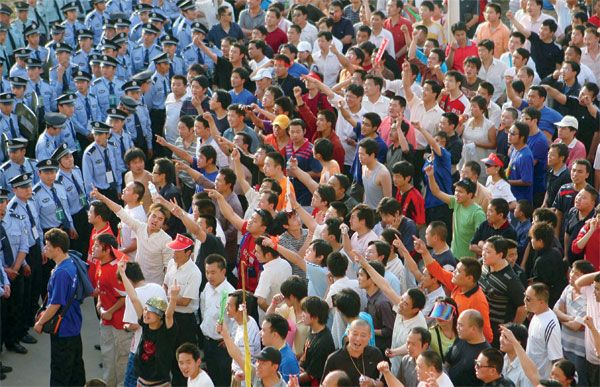
Major clashes with football hooligans in China usually end with police or security in the middle
As the sport continues to grow as a national pastime, so do the connections to international rivalries, some of which conjure up historical animosity. After China lost to Japan 3-1 over
the Asia Cup final in 2004, hundreds Chinese fans engaged with police officers in a brawl that quickly turned heated. The outpouring of animosity stemmed from China and Japan’s tumultuous history, particularly for Japanese war crimes and military aggression during World War II.
The largest issue that plagues the CSL (China Super League) is corruption and match-fixing. A February 2013 report from the UK-based The Guardian indicates the prevalence of match-fixing by gambling syndicates—defenders, particularly goalies and strikers, were frequently contacted by unknown numbers offering sums of money to swing the game in favor of the opposing team. The Guardian article reports that an estimated 30 percent of games are rigged. While the anti-corruption campaign has resulted in the lifelong bans of several football officials, the real organizers and instigators of match-fixing in the CSL are local government officials, who routinely swing football games in favor of another team in order to develop or mend personal and political relationships. The situation is enhanced by the measly salaries and long delays in payment for players, making them eager to accept bribes to support their families. Local officials can even have players removed from team rosters for not accepting bribes. Disgraced CFA (China Football Association) former director Nan Yong even alleged that, for the equivalent of about 100,000 RMB, a player could buy a spot on the national team. As a result, the quality of Chinese football has floundered: a cesspool of ethics violations and flagrant corruption.
“We are angriest at corruption,” Sun grits: “It’s very unfair.”
All this has resulted in a decided loss of sportsmanship across Chinese football.
Still, with the quality of the sport itself in decline, one might understand that the unnecessary roughness of China’s hooligans might actually be a response to the ills of not just soccer, but the country. The stadium is transformed, then, into a thinly-veiled space for commentary on China, a stark opposite to the opiate nature of gladiatorial games in ancient Rome. It’s a place where fans come, not so much to watch soccer, but to scream. Their yelling reflects not just the game, or even the corruption, but also their inability to do anything about it.
Knowing this, it is unsurprising that the China Super League’s fans are increasingly angry at what the league and the state-governing body fails to accomplish, time and again: a fair game.
Chinese You Need
football fan – zúqiúmí, 足球迷
fanatical – kuángrè de, 狂热的
home turf – zhǔchǎng, 主场
brawl – dǎjià, 打架
He is a fanatical football fan
Tā shì yīgè kuángrè de zúqiúmí
他是一个狂热的足球迷
Are they starting a brawl?
Tāmen yào dǎjià ma?
他们要打架吗
By Terence Hsieh (特伦斯·谢) and Tyler Roney. Research by Alicia Zhang (张艾丽西亚)





